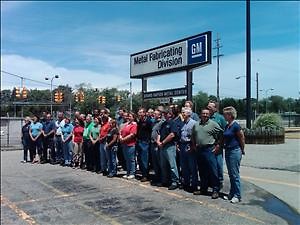If the stories of individuals impacted by the closing of the Wyoming General Motors plant were not told with the actual words of those interviewed, Austin Bunn’s play RUST could be reduced to a narrative of nostalgia or fatalism, but real voices resist falling into easy stereotypes. Many of the people interviewed are revisited over the course of the play, and their tone varies, even over the course of one interview session. Everyone interviewed seemed to have an innate sense of his or her own agency. No one seemed a completely hapless victim.
That being said, for many employed by the auto manufacturers, work was not just what you did, it was who you were. Having several members of the same family working at one plant, either simultaneously or over the course of generations, was not uncommon. Initially, Bunn cannot wrap his mind around this aspect of the auto industry culture. Indeed it is hard to reconcile such a bond between vocation, family, community, and place.
Michael Moore’s Roger and Me (1989) chronicled the impact of GM’s plant closure in Flint employing conventions of the documentary genre. Like RUST, interviews are central to the narrative. In spite of the artificial nature of theater, RUST offers a more accurate picture of the reality of those working in the waning American manufacturing industry. One could argue that twenty years after Moore’s documentary, plant closures were understood as inevitable.
The structure of the play also supports the shifting perspectives of the individuals impacted by the closing of the plant. Not only does each actor play several characters, but a variety of visual and audible information is incorporated within the work. Text from a company handbook issued to those laid off is projected while being read by an unseen narrator. The voices of radio journalists and fragments of popular music and ambient sound, function as something of an audio journal layered with the dialog.
The set features a huge central panel of corrugated steel that the actors open and close to reveal projected photographic images or documentary footage relevant to their respective stories. Remarkably, the complex layering of sound, word and image comes together seamlessly.
Disclosure: Tamara Fox is married to Jonathan Clausen, Director of Marketing and Development at Actors' Theatre
The Rapidian, a program of the 501(c)3 nonprofit Community Media Center, relies on the community’s support to help cover the cost of training reporters and publishing content.
We need your help.
If each of our readers and content creators who values this community platform help support its creation and maintenance, The Rapidian can continue to educate and facilitate a conversation around issues for years to come.
Please support The Rapidian and make a contribution today.



Comments
Really thoughtful review Tamara -- thanks for the consideration. I think you saw exactly the show we were hoping people would see. Thank you. Austin